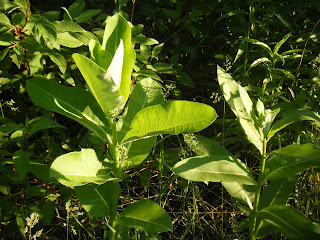It is gardening season, which brings with it, for me at least, the eternal question, what is a weed anyhow?
A friend of mine defines weeds as any plants that grow where you don't want them. Others seem to consider anything that grows naturally, especially native plants, weeds. A third definition identifies weeds as plants that become invasive or detrimental to the local flora and fauna.
As you may have guessed, I find the last definition to be the most acceptable.
Local native plants are well adapted to the area as they have evolved here for thousands of years along with the local fauna. Some plants, such as milkweed (even its common name belies the prejudices we hold!) are crucial to various insects, including pollinators. We rely on pollinators for our fruits and vegetables, so it is important to take their needs seriously. Planting (or letting nature plant) the species that actually really belong in an area is a huge step in helping the local environment.
And before you raise the "native plants are allergens" argument, you need to remember that many introduced species including roses, lilacs and even fruit tree blossoms are also allergens. Killing off all things that have pollen (that would be anything that flowers) because of seasonal allergies is not a viable or practical solution.
In light of this, I have taken it upon myself to rid my property of garlic mustard, many of the dandelions (but not all--see my much earlier post!), a strange thin viny plant the name of which I do not know but it's one that grows quickly and chokes out everything it encounters, purple loostrife, much of the plantain, and any grasses that find their way into my veggie plot.
There is a pattern here--the plants I'm pulling are all invaders that are not part of the native ecosystem.
I also consider Kentucky bluegrass to be a weed. Why? Because it grows incredibly quickly, takes over other grasses, is a water hog, and spreads well, esp. into my veggie garden. It does not tolerate pets particularly well either. Even though we use a push mower, we need to mow every week with bluegrass, but with low maintenance varieties, we could go for three weeks and see the same (or even less) growth. We never watered our low-maintenance lawn, and only once did it go dormant during the summer in the 10 years we were there.
In our new place, the entire back lawn is bluegrass. I have started overseeding it with deep-rooted, drought-resistant, slow-growing seed varieties, but I suspect it will take a few years to overcome. I am debating picking up white clover, which worked very well at our last house, but comes in large packages--way too large for our property! Anyone want to split a bag?
For some fun plant projects to try with the kids, check out the Lemonade plants page here.



No comments:
Post a Comment